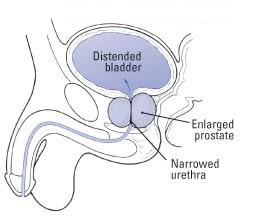
An enlarged prostate is common in men and affects up to 70 percent of men over the age of 80. This condition is often inherited, with some men suffering from it more than others. Other risk factors include obesity, heart disease, and type 2 diabetes. An urologist can diagnose the disease through a standard physical exam. The physician will measure the prostate and evaluate whether nodules have developed. If they do, prostate cancer may be a possibility.
An enlarged prostate is often asymptomatic, and most men do not experience any symptoms. However, some symptoms can interfere with a man’s quality of life, such as waking up in the middle of the night to relieve oneself. Some men have difficulty starting a stream of urine, or they may experience frequent dribbling or leakage. This condition is caused by the changes in hormone levels as a man ages, and many men learn to live with the problem.
Symptoms of an enlarged prostate can include frequent urination and incontinence. The symptoms of benign prostatic hyperplasia (BPH) can include incontinence, frequent urination, and the feeling that the bladder is never empty. A man who has a BPH can expect to experience symptoms such as discomfort while urinating, difficulty starting and stopping urination, inability to pee, and frequent waking.
A man’s enlarged prostate can cause a variety of discomfort. The most common form of surgery for this condition is called a TURP. The procedure is performed through the urethra through an electrical loop that cuts the tissue and seals off the blood vessels. A TURP can be less invasive than an open surgery and has a shorter recovery time than an open surgery. Unlike open surgery, TURP is less invasive and requires a shorter recovery time.
A man’s enlarged prostate can be benign or malignant. A man with a benign enlarged prostate will experience frequent urges to urinate, and may even wake up during the night to go to the bathroom. This condition usually doesn’t affect the bladder’s function, but the frequent trips to the bathroom can be very disruptive and can lead to complications. This condition can also make it difficult to sleep or participate in other activities.
The symptoms of an enlarged prostate can include an uncontrollable urge to urinate, difficulty starting a stream of urine, and dribbling and leakage. Fortunately, there is an effective treatment available that can cure the symptoms and improve the quality of life of men with this condition. There are many non-invasive options available to treat an inflated urethra. Some of these treatments may involve a change in diet and a decrease in frequency of urination.
An enlarged prostate is a common condition in men and is usually benign. This can be annoying and cause many men to miss work, appointments and sleep. But, as a rule, it is not dangerous and does not cause any long-term complications if treated early. A large, unmanageable prostate is not a serious condition and does not require treatment. But it can disrupt a person’s life and prevent them from leading an active lifestyle.
An enlarged prostate can affect your sex life. Symptoms of an enlarged prostate include frequent urination and the feeling that the bladder is never empty. Although the enlargement symptom is not serious, it can prevent a man from enjoying sexual activity. Although this condition can be unpleasant, a man can adjust to the symptoms and enjoy his sex life to the fullest. Frequent urination can be distracting for a man and interfere with his work and daily social life.
Since an enlarged prostate develops slowly, the change is easy to manage. While this can be embarrassing and frustrating, most men find it less painful than being embarrassed about their organ size. The partner and doctor can discuss the symptom and decide on the best treatment option. TURP is less traumatic than open surgery and requires a shorter recovery period. Thus, it is a good choice for men with an enlarged prostate.
In addition to urination, an enlarged prostate can also cause problems with urination. An enlarged gland causes problems with urination, but it can also be caused by other reasons. If you are experiencing any of these symptoms, site https://www.value.co.th/ will be able to determine the best treatment. The patient can get relief from a variety of treatments and choose a course of action based on their needs and preferences. If symptoms persist, a doctor will recommend treatment.